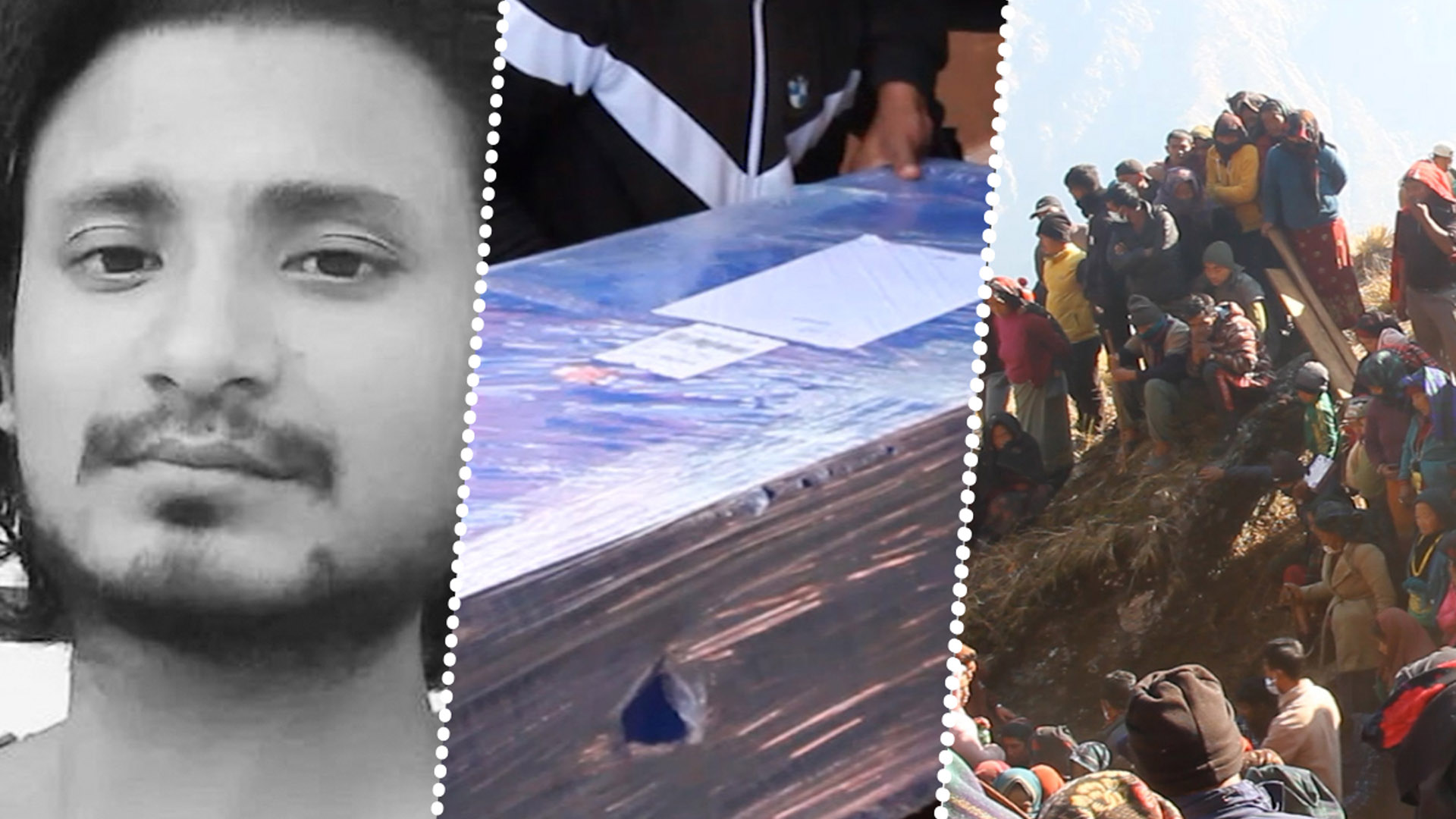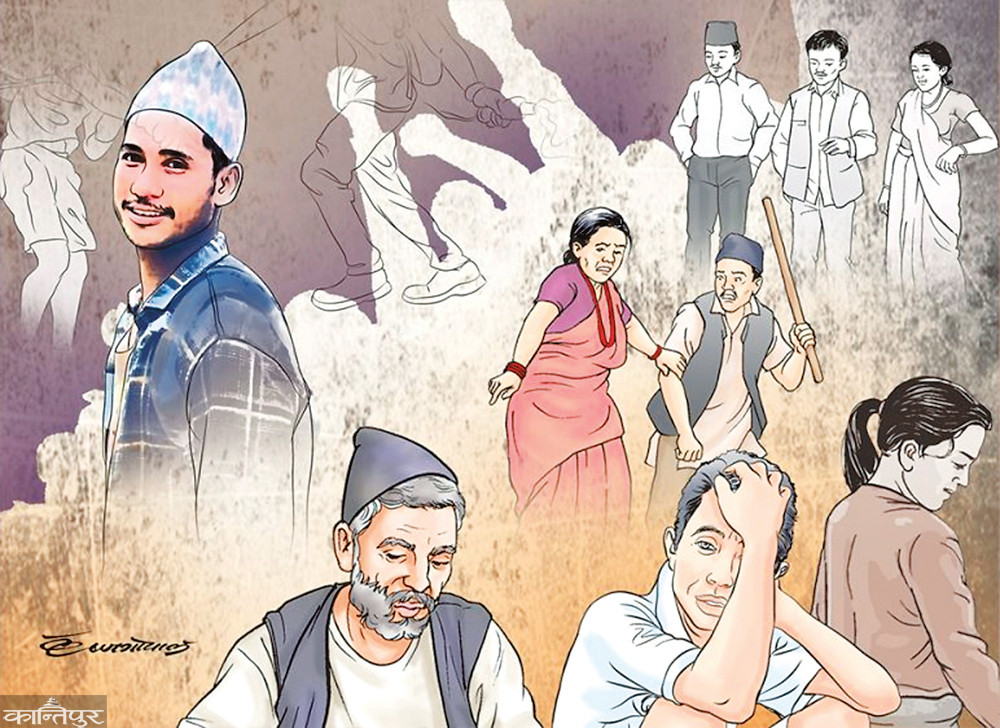Villagers were carrying home the coffin containing the dead body of Roma's father Santa Bahadur. Santa Bahadur’s elder brother had gone to Kathmandu to collect his body. As the village drew nearer Dinesh started hastening his steps towards his home and on reaching home started telling the village folks about the hassles he had to face to get his brother’s body from Kathmandu. He also started discussing with his relatives on the future course of the family.
Santa Bahadur, who was from Dharche-3 of Gorkha, had left home for greener pastures in Malaysia on the eve of Dashain with the dream of educating and bringing up his children in the best manner possible. He wanted to give his children a bright future. He had got a job at Fazer Sukma Cleaning Service Sdn Bh which was based in in Johor Bahru, Malaysia. The work was not that difficult and he had no issues with his salary and other facilities. However, less than three months later, on December 28, 2022 (Poush 13, 2079), he met with a car accident while on his way to work. He was immediately rushed to a hospital where doctors declared him dead three days later.
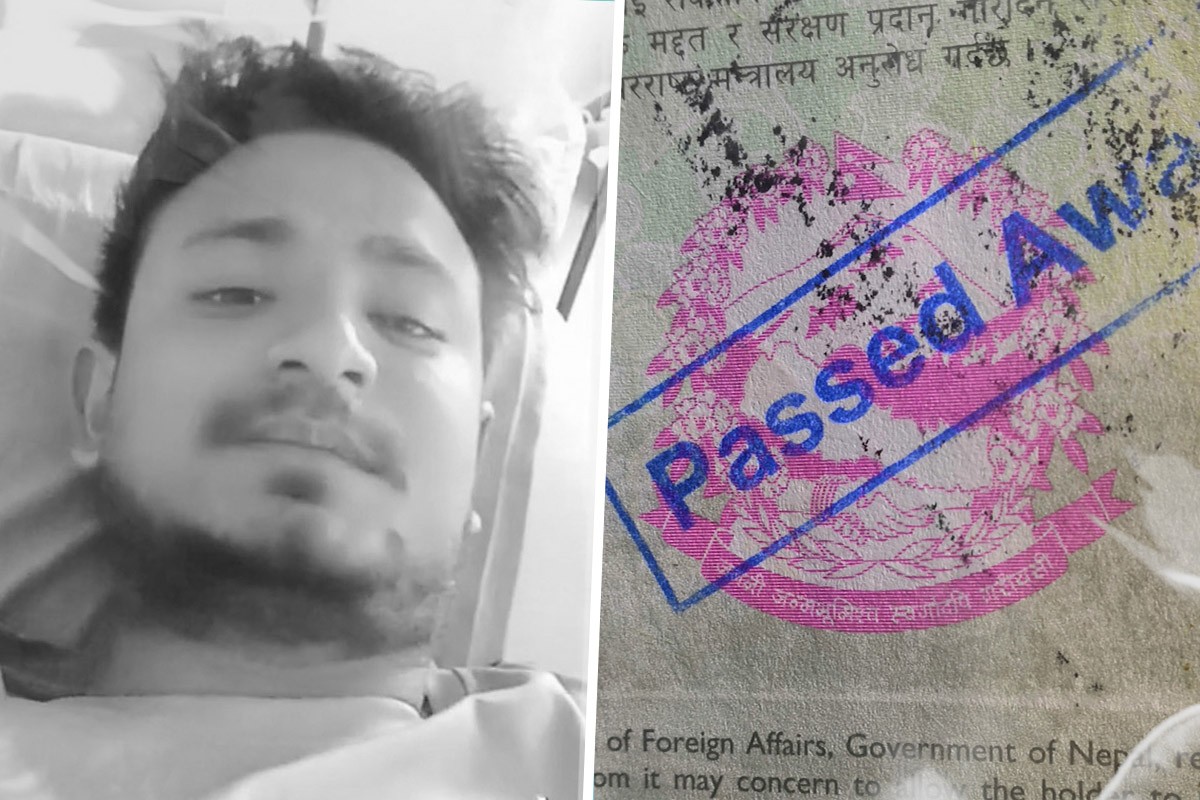
The Malaysian company had arranged to send Santa Bahadur’s body to Nepal and it took 10 days for the body to arrive in Kathmandu. Dinesh had brought his brother’s dead body from Kathmandu to the village on a vehicle that was managed by the Foreign Employment Board. Since there was no proper road for the vehicle to reach Santa Bahadur’s house, the villagers had to carry the coffin for the final stretch.
As soon as the villagers laid down the coffin carrying Santa Bahadur’s body in the courtyard, his wife Juna, broke down. She started wailing and blaming God for having snatched away Santa Bahadur from her. She was stricken with grief and also fainted on a number of occasions. In the meantime, the neighbours kept asking Juna to control herself and gather her composure because she also had her children to look after. However, the villagers themselves had tears in their eyes.
According to her family members, Juna was in a state of shock since the moment she had received news of her husband’s death. It was a poignant moment because not only had Juna lost her life partner but also her financial support system. The family’s support system was shattered and she had a 15-month-old son and two daughters who were 8 and 6 year old to look after.
Santa Bahadur had a small house and a small patch of land where his family could grow vegetables. He did not have any large agricultural land where he could grow paddy. Since the income generated from the sale of vegetables grown in that small patch was insufficient Santa Bahadur used to work as a daily wage labourer. Santa Bahadur was fed up with this type of work because there was a lot of effort involved but the pay was minimal. He did not want his children to face a similar situation like his in the future. It was due to this desire to make his family better he started dreaming of going abroad for foreign employment.
A foreign employment agent took Santa Bahadur to Minwa Recruitment HR Pvt. Ltd. which was located in Sinamangal, Kathmandu in 2078. After taking a fee of Rs 1.5 lakhs, the company sent him to Dubai.
On reaching Dubai, Santa Bahadur started working. However, he was stunned when he learnt that he was in Dubai on a visit visa because taking up a job while on a visit visa is illegal. The validity of the visa was only for three months and it was not extended. He, however, decided not to return home and kept working in the same company which was illegal. Since Santa Bahadur was working illegally, the company stopped giving him salary. After spending a year more, he borrowed Rs 1.5 lakhs from his friends and returned home.
Santa Bahadur, who previously had to only think about providing for his family, now, had a burden of paying back the loan he had taken while going to and returning from Dubai. He did give it a thought but he did not see the possibility of employment or business in Nepal. He then got in touch with Reliance HR Solutions Pvt. Ltd. which is located in Gongabu, Kathmandu, which sent him to Malaysia at a cost of Rs 2.4 lakhs. But as fate would have it, Santa Bahadur died within three months of his arrival in Malaysia.
The responsibility of taking care of the elderly parents and three minor children and also paying off the money borrowed by her husband while going abroad for work now fell on Juna’s shoulder. For somebody who had received help from neighbors and friends to conduct her husband’s last rites, “We have loans of around Rs 9 lakhs and how am I going to pay it back,” Juna sighs.
Juna’s elder daughter, Rozina, studies in class 3 and Roma is in class 1. Her 15-month-old son, Roman, is still too small to join school. Juna’s younger brother is studying hydropower engineering in Shankharapur Polytechnic Institute in Kathmandu with the financial support of Santa Bahadur. Juna is now responsible for the education of all of them but she has no clue as to how to go about managing the resources. The only thing she knows is that if her children are not raised properly and sent to school then they will end up being daily wage labourers like their father. Juna is also worried that her children could go astray if she is not able to look after them properly.
Meanwhile, Dinesh informs that the only one hope for Juna and the children are the insurance money and financial support of the Foreign Employment Board. If a migrant worker who has gone abroad legally after obtaining a work permit dies during the work period, the Foreign Employment Board provides a relief of Rs 7 lakh to the deceased’s family. There is also a provision whereby a migrant worker can receive an amount of Rs 10 lakhs to Rs 14 lakh through the foreign employment term life insurance. Santa Bahadur had gone to Malaysia legally with a work permit.
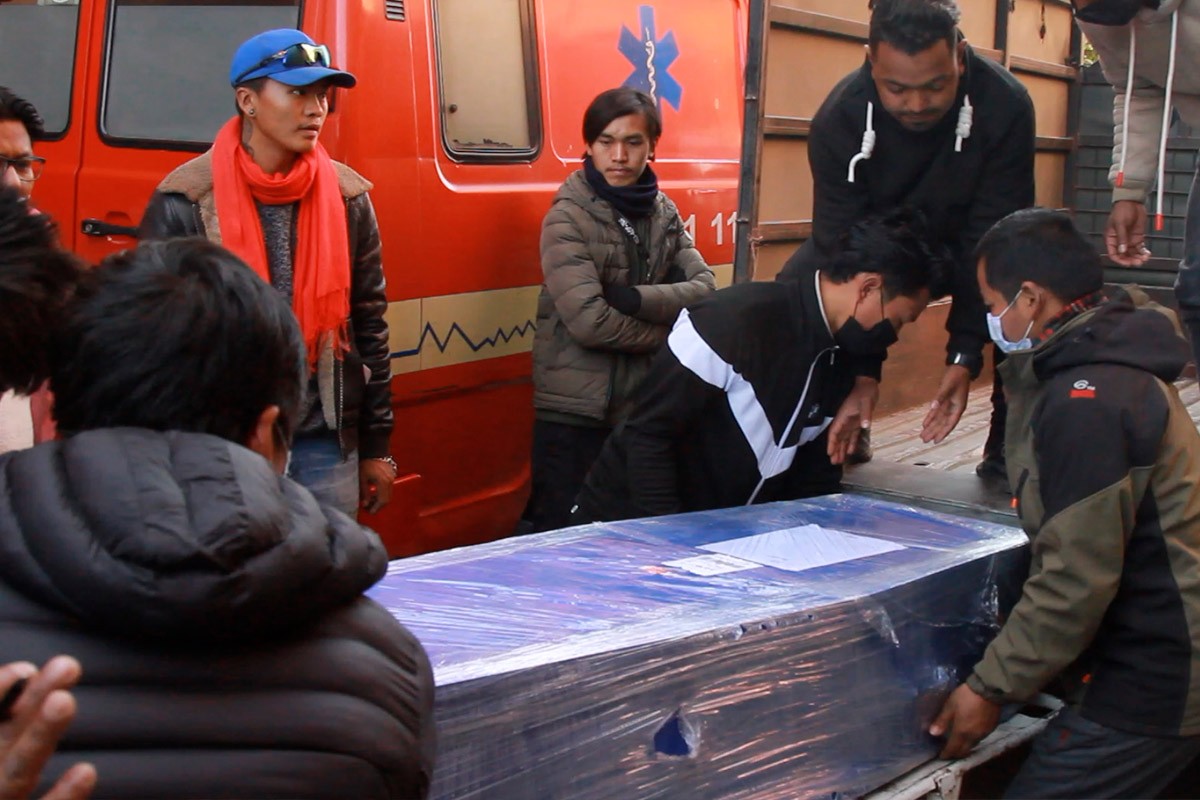
There are many women who are facing many financial, social and mental problems after the death of their husbands who had gone abroad for employment. One such example is Sarita Pun of Butwal. After her husband, Ram Bahadur, died in Saudi Arabia, Sarita is now going through mental distress.
Ram Bahadur had gone to Saudi Arabia three years ago. On December 19, 2022 (Poush 4, 2079) he had gone to sleep after having spoken to his wife, Sarita. But he never woke up the next morning. Sarita does not know the cause of her husband’s death.
Sarita has been trying to cope with this huge loss in her life but now her sorrow has been compounded by the fact that her son’s academic performance has started suffering. “He was studying well in Class 9 but ever since his father passed away he rarely goes to school and spends most of his time just gazing blankly,” says Sarita, adding she is very worried about her son. Meanwhile, her elder son has gone to Kuwait for employment purposes.
Ram Bahadur had taken a work permit while going to Saudi Arabia but he had not renewed the permit after it had expired. As a result, his family did not receive any insurance money or other form of financial help from the government, Sarita informed. “We didn’t receive any help to even perform the final rites of my husband,” she laments.
The financial condition of Surya Mahato Chai of Parsa was pretty bad. His situation became worse and he was not able to feed his family properly after having six children in very short intervals. With a dream to provide a better education and lifestyle to his children and to economically contribute to the family, Surya went to Riyadh of Saudi Arabia for work.
Since his earning was good, Surya came home during one of his vacations and renewed his work permit before flying back to Riyadh. After his work permit expired he was making plans to come to Nepal to get it renewed but he fell ill. He died due to that illness on December 11, 2022 (Mangsir 25, 2079) after which his family started facing huge problems.
After Surya’s death his children’s education has suffered a lot. His eldest son, Mukesh, who studies in Class 12, has been doing the rounds of Foreign Employment Board with various letters of recommendation in the hope that his family will be able to receive compensation. As a result, Mukesh has become irregular in his classes.
Mukesh informed that the Foreign Employment Board only provided Rs 25,000 for his father’s funeral and refused to provide further financial assistance citing that his father had died after the work permit had expired. However, he has been claiming for the due compensation from the board based on Section 28 (1) of The Foreign Employment Rules, 2008, which states that the family of a deceased migrant worker can claim for compensation within one year of the concerned worker’s work permit having expired. “If we do receive some financial assistance it will be easy to run the family and also carry on with our studies at least for some time,” says Mukesh.
Mukesh’s younger siblings are all in school. Since he is the eldest son of the family it has now become his responsibility to help his mother with all household affairs. That is why he is now scared that he will not be able to further continue with his studies. “If I get the chance to study further I may be able find a good job but in today’s world where will we be able to find a proper job without higher education,” he sighs.
The Foreign Employment Board has conducted a study on the effects that is has on children when their parents go abroad for foreign employment. As per the study report that was published in 2007 B.S., children of families whose father or mother had gone for foreign employment were at risk of physical and sexual violence, child labour and there were also high chances of them falling prey to drug addiction. Due to the extra work pressure and mental burden, it affects their education too. It also has a psychosocial impact on them. If the parents of the children who are going through such risks and problems die when they are still abroad then the impact could be even greater.
As per data, within fiscal year 2065-66 to Falgun of Fiscal Year 2079-80, a total of 5,415,379 individuals have obtained work permit to go for foreign employment among which 5,091,746 are males and 323,633 are females. According to Rajan Paudel, the then spokesperson for the Foreign Employment Board, 11,562 migrant workers have lost their lives in foreign destinations while still employed there. Meanwhile, 2,250 have suffered physical injuries within the abovementioned period. Another very sensitive social aspect related to foreign employment is the high risk of sexual violence/exploitation and rape of children. In a study conducted among 720 respondents in 9 districts of Nepal, 57% of the families who had gone for foreign employment were suffering from anxiety, 26% had issues with depression, 7% with suicide and 3% with other serious mental disorders. The report of a study conducted on the impact of foreign employment on children in 2076 B.S. mentions that 1.8% of children of parents who have gone for foreign employment have symptoms of anxiety, 1.1% of hopelessness and depression, and 0.4% had suicidal tendencies.
In Fiscal Year 2078-79, 2001 female and 208 male children of parents who died while in foreign employment received scholarships from the Foreign Employment Board, while 990 female and 1,044 male children will receive scholarships as per a decision taken on Falgun 4 of Fiscal Year 2079-80.
If any worker loses their life during the visa and work permit period, the board provides financial assistance to the families of such workers. A work permit is valid for two years. In case of death due to any reason during that period, an application must be submitted to the secretariat of the board within one year. In case a migrant worker dies while returning to Nepal on leave then a certificate from the respective ward office must be submitted to the board to receive financial assistance. If the worker was taken to a hospital then the death certificate issued by the hospital must be submitted.
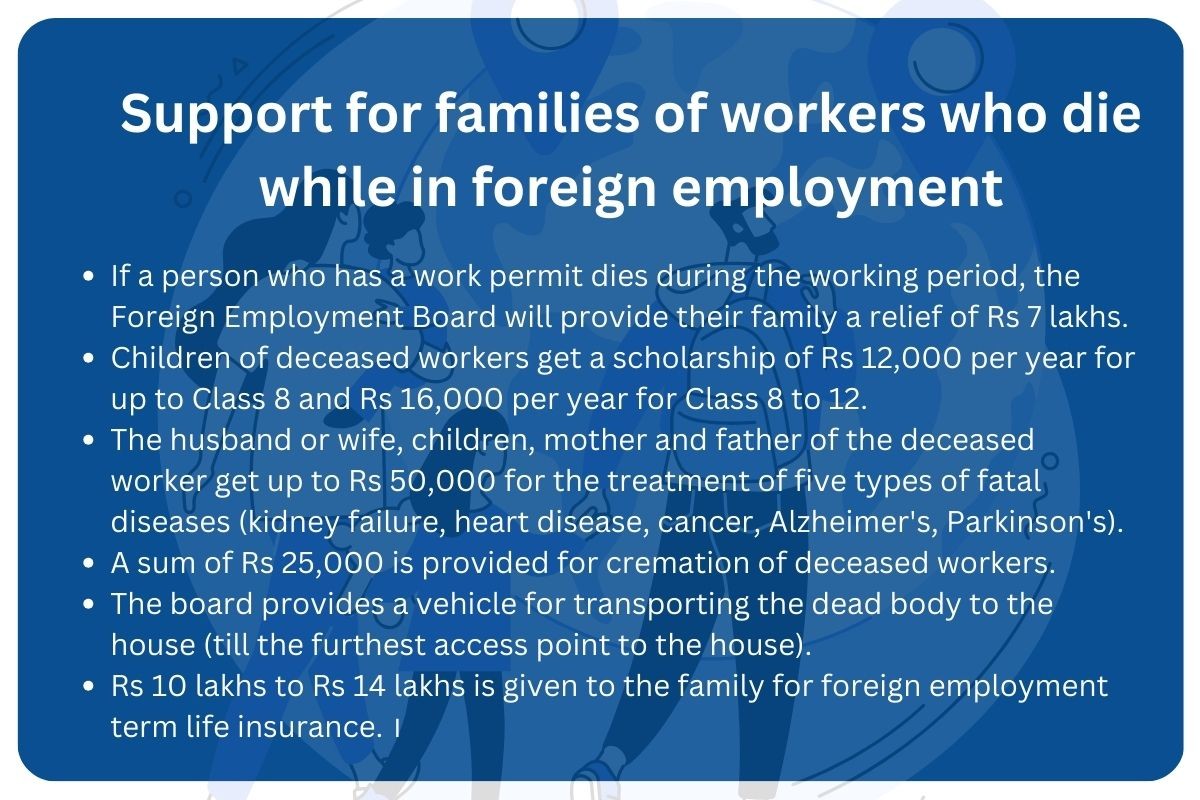
To be eligible to receive financial assistance from the board the family members of the deceased worker must submit recommendation letters issued by their respective local government while filing their applications. "Once the application has been verified, the board will directly deposit the amount in the bank account of the relatives of the deceased," informed Paudel, the then spokesperson for the board.
Many people have no idea about the type of assistance that the board provides. When Dinesh Sunar of Gorkha, Dharche-3 was told about such assistance he was surprised. He didn’t know anything about this help. By the time this story is published Santa's family will have already received the insurance money and the amount due from the Foreign Employment Board, but there is no information about the education expenses of their children.
Read our guidelines for Republishing this story here.

